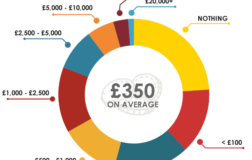COVID-19 UK student survey 2020 (follow up) – Results
For students across the country, their university experiences have been hugely shaped by the coronavirus pandemic. This survey reveals what it's really like to be a student in 2020/21.
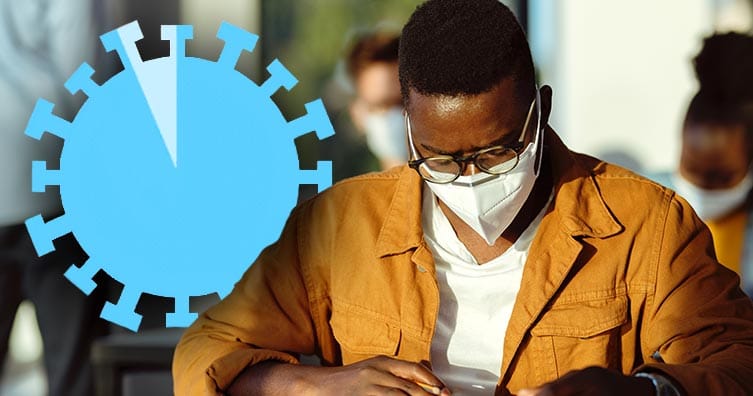
Credit: Drazen Zigic – Shutterstock
Since our previous survey on the impact of COVID-19 on students from May 2020, the start of the new academic year brought with it yet more change, challenges and uncertainty.
In the first term of 2020/21, shockingly high proportions of students in the UK have faced periods of self-isolation, issues with their mental health and feelings of loneliness.
Our new survey of 2,076 people in the UK reveals the true experiences of university students during the pandemic – and the results are very concerning.
What's in this report?
- Problems students have experienced due to coronavirus
- How many students have had COVID-19?
- What issues worry students the most?
- How many students follow the coronavirus guidelines?
- How are students making up for lost income?
- Impact of coronavirus on students' accommodation choices
- Were universities clear about what 2020/21 would be like?
- When do students expect face-to-face teaching to return?
- How do students feel about their graduate job prospects?
- Expert comments on our findings
Student problems caused by coronavirus
For the vast majority of students, the COVID-19 pandemic has caused problems.
When asked about whether coronavirus has impacted particular areas of student life like academic studies, finances, mental health and more, 94% of students in the survey told us they'd been affected in some way.
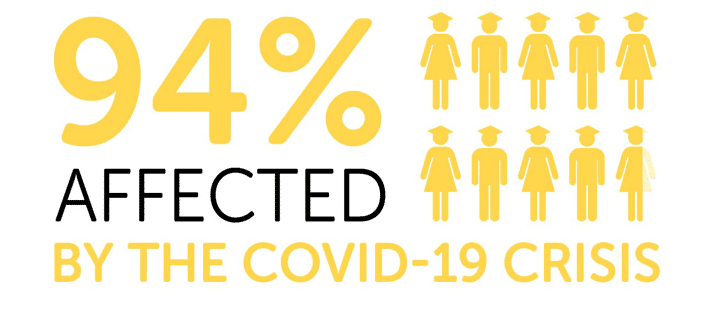
Three in five said they have needed to ask for help with issues related to COVID-19. The support should be there for those that need it, but of those that have asked for help, 39% said that it was difficult or very difficult. Worryingly, as little as 3% said they found it very easy.
The survey asked students about a range of possible factors. Out of the five key problems, mental health was the most common issue, with an alarming rate of students saying that theirs has been impacted by the crisis.
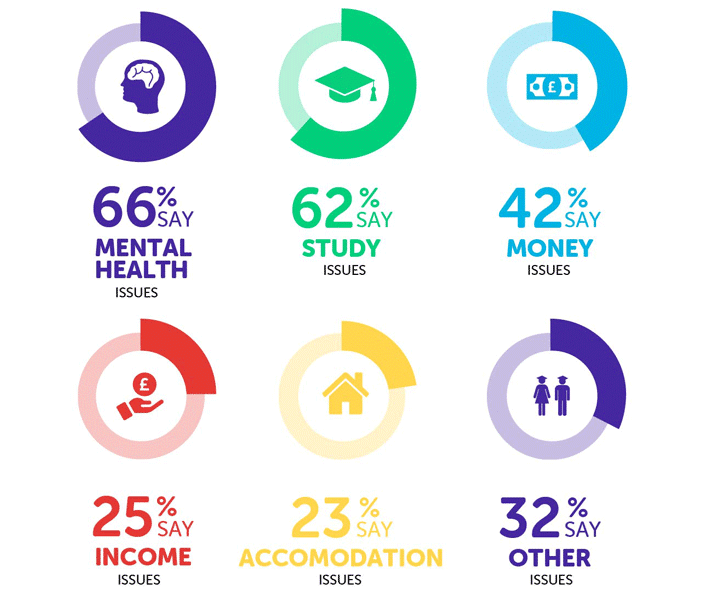
The pandemic has also had an impact on the majority of students' abilities to study, with 62% saying this has been an issue for them.
This is most likely linked to the widespread changes to teaching practices in universities in response to the government's guidelines. A lot of unis have replaced in-person teaching with online lessons, but this isn't necessarily what all students want...
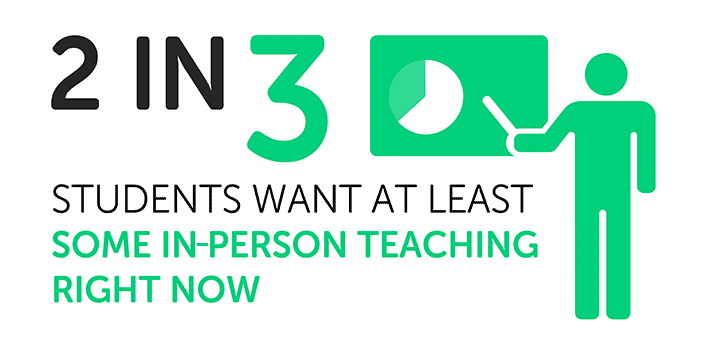
Deciding how much (if any) teaching should be offered in person is, of course, very complicated.
54% of students said they'd prefer blended teaching right now, and a further 13% said they'd like to be taught entirely in-person. However, universities will need to consider this alongside the physical health risks of students and teachers meeting face-to-face.
This is particularly the case as we've already seen relatively high rates of students saying they've had the virus, or know someone that has.
Coronavirus rates among students
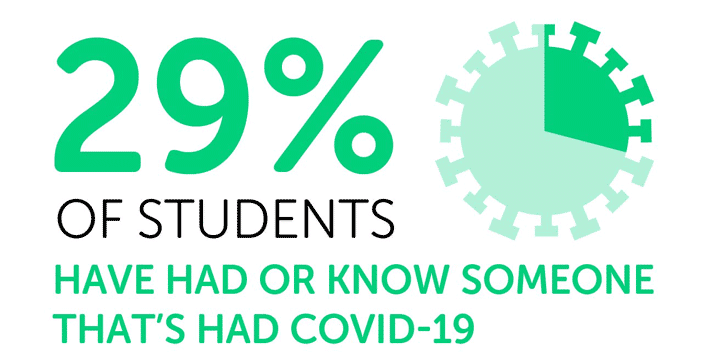
With just under three in 10 students saying that they've had, or know someone that's had, COVID-19, the rates of coronavirus across universities appears to be pretty widespread.
To manage the rates of the virus, people across the UK have been encouraged to download the official Test and Trace apps. Are students using the apps?
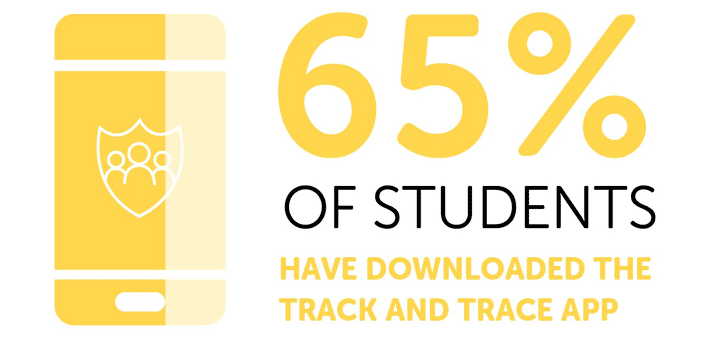
While most students said that they've downloaded the Test and Trace app, a further 9% had downloaded it, but have since deleted it.
Compared to the proportion of students who have had, or know someone that's had coronavirus, the percentage who have needed to self-isolate is even higher – likely thanks, in part, to the track and trace system.
This could also be a result of some students travelling and needing to self-isolate on their return, and others self-isolating while waiting for a test result which then came back negative.
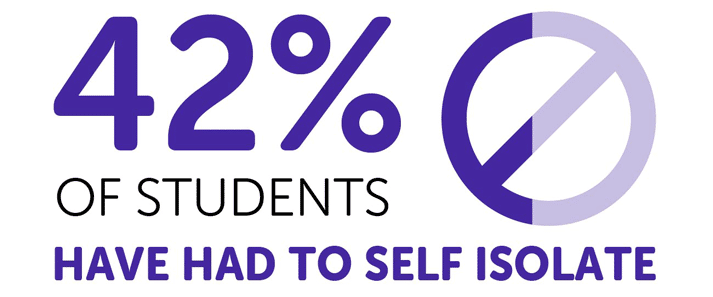
It's important to consider whether the high numbers of students needing to self-isolate is contributing to the high rates of mental health issues reported by those in our survey. As we'll explore in more detail shortly, loneliness is a big worry for a lot of uni students right now.
What students say about self-isolation
- [...] Every person I know at uni has had to isolate at some point.
- I was self-isolating for 14 days. On my first day out I went to uni for one hour and as a result had to self-isolate for another 14 days.
- The looming worry that I could have to isolate again if one of my flatmates gets tested positive is having a negative effect on me. Very uncertain year.
- A massive Halloween party was held on Saturday, with loads of strangers turning up to our accommodation. Now we're all in isolation because one of my housemates [is] COVID positive. No idea how many people have been affected and where it has spread...
- Downloaded the Track and Trace app. While on shifts at my (retail) job I get told to self-isolate by the app several times a week. I don't bother, and neither do any of my colleagues (about 1/3 of us [are] students) because we're dependent on the job for money.
What issues worry students the most?
As we mentioned earlier, nearly all students in the survey have told us they've experienced issues related to the coronavirus pandemic.
But looking ahead, what issues are students most worried about facing?
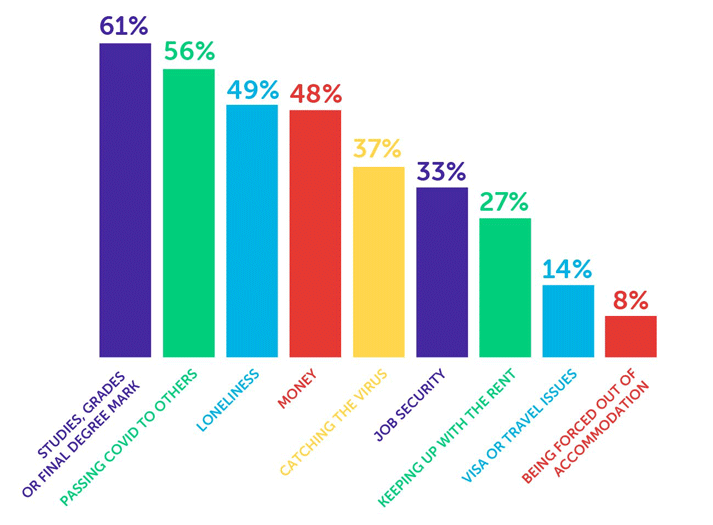
Interestingly, students are generally far more likely to worry about passing coronavirus on to others, than about catching it themselves.
Loneliness is another significant worry for students. On top of the 49% that told us they are 'really worried' about this, a further 36% said they have mixed feelings about it. Only 15% of students in the survey said they are not worried about feeling lonely.
And three in five students are concerned about the potential impact of the COVID-19 crisis on their studies and grades, again linking to the difficult question of whether or not unis should be offering online, blended, or entirely in-person teaching this academic year.
What students say about online teaching
- I've just started a master's, so I knew to expect difficulties, but it's so much more lonely than I expected [...] I'm having to pay so much for what essentially feels like a subscription service.
- Online learning material is not of a high enough qualitiy to justify the fees we are paying.
- I lost my job and moved back home to take care of my elderly grandfather. I haven't seen anyone my age in person since March. I'm finishing final year of uni online, and feel quite isolated and stressed overall.
- Hoping for uni to still be blended/online next year as I am unsure about moving back to the UK as an international student, especially if future lockdowns will happen again (as I couldn't get on a flight at first for the lockdown in March/April).
- Most classes being online is making it really hard to concentrate / socialise.
- My entire course has moved online. I struggle to concentrate as a result and my grades are falling.
Are students following government guidance?
Just over three quarters of students in the survey told us that they have been following the government's coronavirus guidance all of the time, with a further 23% saying they have most of the time.
This leaves just 1% that told us they haven't been following the guidance.
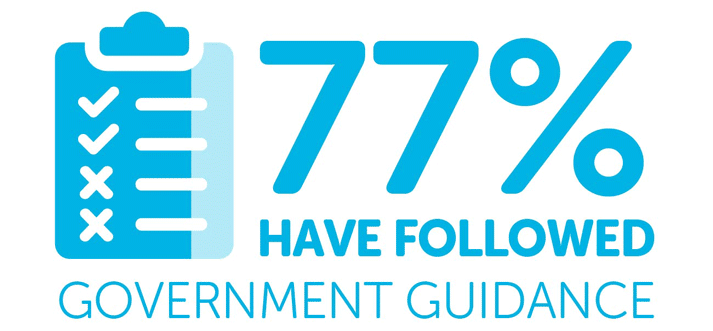
This is a noticeable difference from our first COVID-19 survey from May, in which nearly all students (94%!) said they had been following social distancing rules.
One contributing factor for this could be that, for three in five students, the government's rules aren't clear enough...
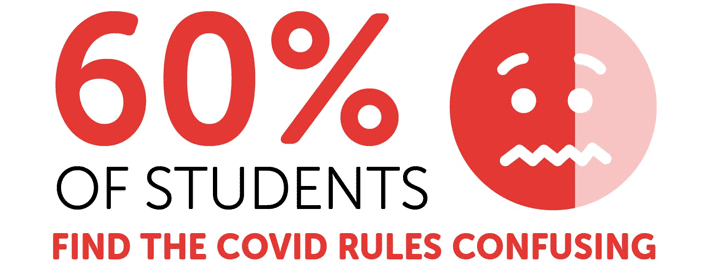
What students say about the government's guidance
- I'm not 100% sure of the rules but I think I follow them.
- Hardly ever leave the house. When I do it's with a face mask and hand sanitiser. Following all of the rules.
- University activities kind of require to break the rules in order to study, which doesn't always make sense.
- One of the student halls has police over 24/7 because of how many people have been breaking the rules.
- I feel the rules do not make sense and, even when practiced as instructed, will still result in the virus being passed on. As a student, I feel most people are expecting to catch it at some point this year.
- Sometimes you try to follow the guidelines but people around you don't comply and you find yourself following them.
How are students making money during the pandemic?
With a quarter of students losing a job or other source of income due to coronavirus, how have students plugged the money gap?
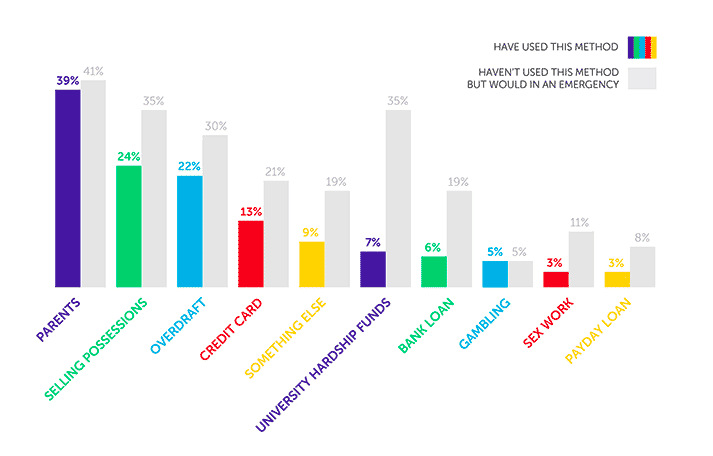
The most common way that students have made up for lost income has been from asking their parents for money, followed by selling possessions which around a quarter of students have said they've done.
Although credit cards can be used safely, it's concerning to see 21% say they would use one in an emergency.
If there's a risk that the repayments won't all be made on time, as there could be for students in a cash emergency, we'd strongly advise against using credit cards as they could impact your finances and credit score.
Our guide to credit cards includes advice on how to use them safely, and the risks to be aware of before using them.
What students say about making money in the pandemic
- Plugging the gaps with a University Hardship Fund is very difficult to qualify for.
- It's difficult applying for placements as companies are still unsure about their future. Money has been tight and it's even tighter now that I can't rely on my parents. It's difficult to find a secure job.
- Unable to get a job and parents are unable to offer any financial support so I am struggling for money.
- I have actually saved money during the pandemic as all I am paying is rent, bills and for food [...]. I managed to get a job during the first lockdown at a COVID testing centre, so I'm actually doing better financially this semester than the last.
Has coronavirus affected where students live?
According to our latest National Student Accommodation Survey from February 2020, 12% of students were living with their parents.
However, in this COVID-19 survey, we've seen a huge shift towards more students living at home during term time due to the pandemic.
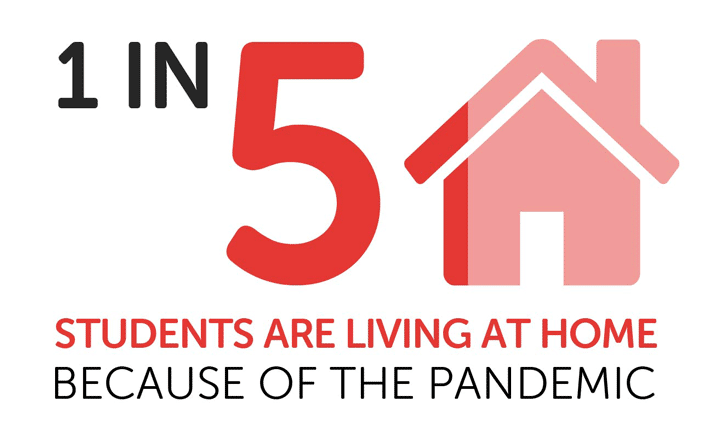
Of those surveyed, 34% said that the pandemic has affected their accommodations choices in some way. This includes 14% who decided to stay at home from the beginning of the academic year, and 6% who moved home after the start of the year.
Another 5% of students said they're planning to move back home, so we could still see the numbers of students living at home rise further.
Are students planning to go home for Christmas?
For the students who have moved away from home for the term, whether into student halls or privately rented accommodation, a big question right now is: are they planning on going home for Christmas?
For the majority of students, the answer is yes.
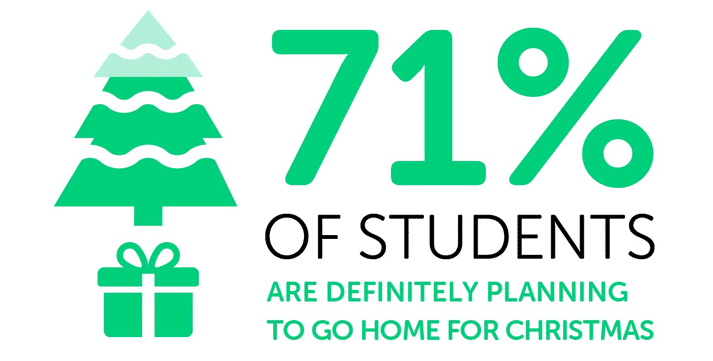
A further 17% of students in the survey were still unsure, with 12% saying that they planned to stay put.
However, it's important to bear in mind that since the survey launched, more students may now plan to go home for Christmas as more is known about how the government and unis are working to help students travel back safely.
News about mass testing, in particular, could influence more students to go back home this December.
Were universities clear about what 2020/21 would be like?
This year more than ever, clear and accurate communication from universities about what students could expect was essential. But our survey shows that this, too often, was not the case.
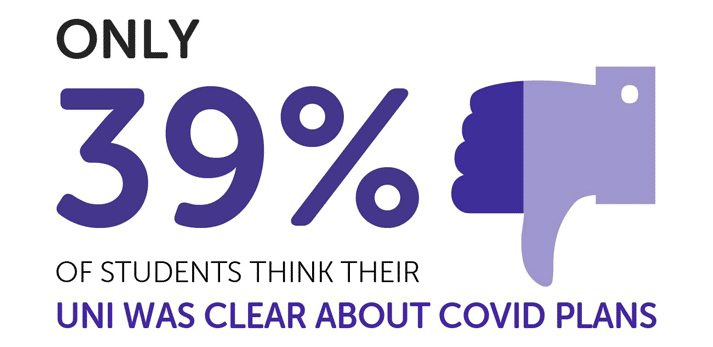
With 46% thinking their uni was not clear about what the first semester of 2020/21 would be like, and a further 16% saying they're unsure, it's perhaps no wonder that so many students would like a tuition fee refund.
Are students expecting tuition fee refunds?
When asking students how they feel about getting tuition fee refunds, we broke it down into three questions: do students expect a refund, would they like one, and do they know how to claim one?
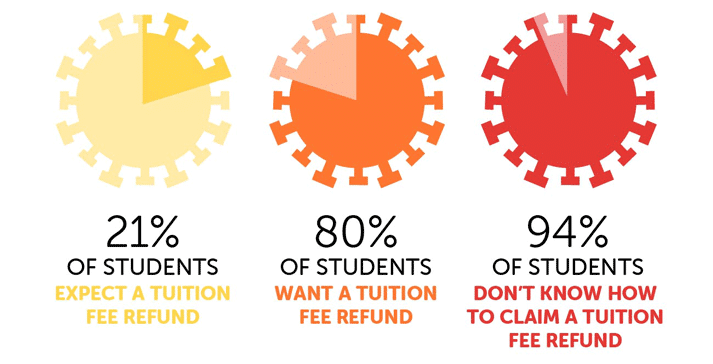
Although the vast majority would like a partial or full tuition fee refund, only a minority expect one.
While some students may simply feel like their chances of getting a refund are slim, the difference between the numbers of those wanting and expecting a tuition fee refund is likely linked to very few actually knowing how to claim one.
This is important information for any student who is concerned that they're not getting their money's worth at uni. So, for only 6% of students to know how to approach getting a refund, it's clear that this info should be more readily available for those that need it.
When do students expect in-person teaching to return?
As we mentioned earlier, two in three students want at least some face-to-face teaching right now. But, looking ahead, when do students expect full-time in-person teaching to return?
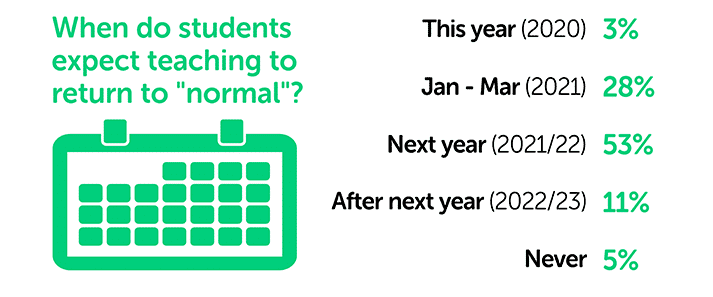
On the whole, students are pretty optimistic that their university will fully return to in-person teaching relatively soon, with the majority thinking that this will happen in 2021/22.
Plus, over a quarter of students think that full-time in-person teaching could return as soon as January – March 2021.
Impact of coronavirus on graduate job prospects
The pandemic, along with Brexit, has greatly affected the economy this year.
Particularly with many companies unable to continue recruiting and running as usual this year due to the coronavirus restrictions and consequent economic impact, the pandemic has had a big effect on how students feel about getting a job after uni.
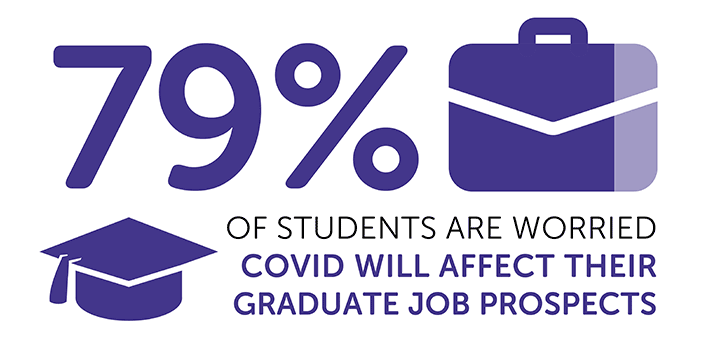
Here's a breakdown of how many undergraduate students in each year group are worried about their job prospects following the pandemic, compared with the results from May 2020.
| University year | Students worried about finding grad jobs (May 2020) | Students worried about finding grad jobs (November 2020) |
|---|---|---|
| First | 67% | 75% |
| Second | 66% | 79% |
| Third | 77% | 85% |
| Fourth + | 70% | 70% |
In the past six months, there's been a clear rise in the proportions of students in years one–three who are concerned about the impact of COVID-19 on their graduate job prospects.
Perhaps unsurprisingly, third-year students are the most likely group to worry about finding a job after uni – but to see such a high proportion worried about their career prospects really is alarming.
We also broke down the stats by gender, and noticed a striking difference between how female students feel about their graduate job prospects, compared to male students. While 75% of male students told us they were worried about this, 80% of female students said the same.
This mirrors an ongoing trend we've followed in our National Student Money Surveys, which has seen male students consistently giving us higher expected starting salaries on average than their female peers.
Therefore, male students generally seem to express more confidence in their graduate job prospects than female students, and the impacts of coronavirus have highlighted this disparity.
What students say about their graduate job prospects
- There will be unprecedented demand for graduate schemes. Last year's graduates are still searching roles, those that were travelling after university will no longer [be] doing so. This will be the greatest competition for entry level jobs since post-2008 crash.
- It's difficult applying for placements as companies are still unsure about their future. Money has been tight and it's even tighter now that I can't rely on my parents. It's difficult to find a secure job.
- I'm not worried about a graduate job because I already have a job offer due to previous work. If I did not already have that before COVID then I would be worried as I know a lot of people that just graduated on my course that are having those difficulties.
- There will be two-years' worth of students fighting for the jobs so it will be difficult.
Expert comments
This survey brings to light some really significant challenges that students are facing this academic year – for too many students, their mental health, grades, finances and more are struggling as a result of the pandemic.
For these students, it should be easy for them to access the help they need. But, unfortunately, our survey indicates that this is often not the case.
Save the Student's money expert, Jake Butler, said:
Students are among the groups worst affected by the coronavirus pandemic.
It's clear from our stats that many have experienced job losses, lack of access to university facilities, accommodation issues, poor communication and so much more.
The toll this has taken, and is still taking, on students' mental health is really distressing to see.
We could be creeping towards a huge and very damaging mental health crisis among students.
Without action from the government and universities in a number of key areas such as student accommodation, student funding and tuition fee refunds, we can expect students that have struggled through the first semester to face even more difficulties ahead.
Hillary Gyebi-Ababio from the NUS adds:
These findings are no surprise.
Students are facing severe hardship, and have been left out of support available to other parts of society.
The actions of universities, locking down and fencing in their students, have only served to make the student mental health crisis even worse.
Students have been let down at every turn of the pandemic, and we deserve better.
About this survey
Our findings are completely independent: we don't conduct our surveys to sell products to students, or to keep universities and advertisers happy.
Since 2013, we have reached out to university students all over the UK for their honest opinions about university, with a focus on student money. We crunch the numbers to tell it like it is and improve the advice we provide across our website.
If you want to know more about the survey, need case studies, comments or quotes, we're happy to help – contact us.
- Source: COVID-19 UK student survey (follow up) / www.savethestudent.org
- Survey polled 2,076 university students in the UK between 23rd October – 10th November 2020
- Data from previous surveys
- Save the Student Press Page
- Tools and resources.
Student Money Cheatsheet
Download The Student Money Takeaway for free. This printable PDF distils the very best advice from our website onto just two pages, including a one-minute budget sheet. It's designed to be accessible, fun and engaging.
We created this resource in response to the concerning findings from our recent student surveys.


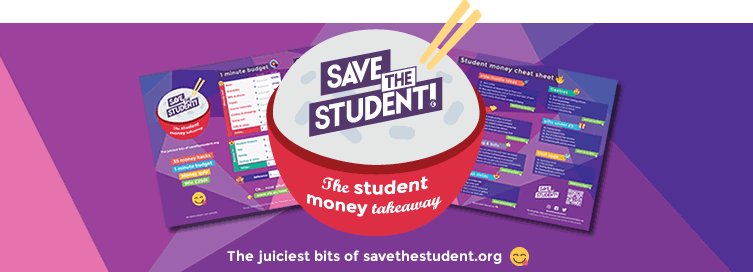




![What do students spend money on? [stats]](https://www.savethestudent.org/uploads/what_students_spend_money_on2-252x160.png)
![What do students spend money on? [stats]](https://www.savethestudent.org/uploads/what_students_spend_money_on2-100x100.png)
